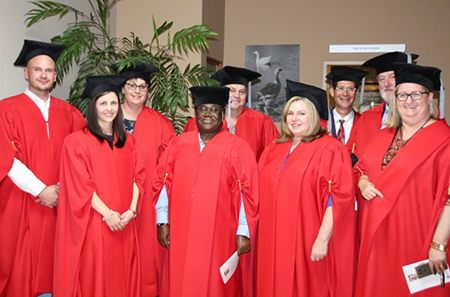“Grit” is a positive, non-cognitive trait based on an individual’s perseverance - combined with a passion for a particular end-goal. Would the Enron story have ended differently had they rather focussed on recruiting individuals with grit?
Prof Llewellyn van Zyl, extraordinary professor at the Optentia research focus area on the North-West University’s (NWU’s) campus in Vanderbijlpark, reckons it would have.
During his prestige lecture, Prof Van Zyl argued that organisations become obsessed with finding and recruiting the best individuals. In the process, however, they create a narcissistic ego-driven environment: the perfect climate for unethical behaviour to thrive in.
He shared the findings of his research which indicated that individuals with the highest potential and best qualifications are not necessarily the best performers.
Initially such individuals perform above and beyond expectations. This level of achievement eventually dwindles however, or at best reaches a plateau.
Individuals who exhibited grit seemed to start slower, but achieved more over time. They exerted a lot more effort in achieving their individual goals (obviously attached to the organisation’s mission and vision). They were also able to maintain their efforts due to their inherent high levels of perseverance.
Prof Van Zyl identified the components of grit as passion, perseverance and environmental agility. He explained that a person with grit will show special interest in a long-term goal and invest a lot of time and energy in achieving that goal (passion). Such a person will push him/herself even beyond the point of furthest efforts (perseverance), and adapts easily to challenges experienced (environmental agility).
The good news, according to Prof Van Zyl, is that grit can be cultivated. When an individual is given the opportunity to grow and work autonomously in a programme in which they are interested or talented in, grit can be developed.
Could the Enron story have ended differently? No-one knows. What we do know is that recruiting individuals with grit results in an organisational culture where narcissism and ego plays a much smaller role. It leads to a culture that nurtures a happier employee towards sustained optimal performance.

Front from left: Dr Leoni van der Vaart, Prof Yaw Amoateng, Prof Elrie Botha and Prof Susan Coetzee-Van Rooy. Back row from left: Prof Llewellyn van Zyl, Prof Mirna Nel, Prof Ian Rothmann (Director: Optentia), Prof Jaco Hofmann and Dr George Leeson (Oxford).
About the expert
Prof Llewellyn van Zyl (PhD) is currently an assistant professor of Work and Organisational Psychology at the University of Eindhoven in the Netherlands. He holds a C2 rating with the National Research Foundation.
He has completed a PhD in industrial psychology, specialising in the development and evaluation of positive psychological interventions aimed at happiness. He also holds an MSc, honours and a bachelor’s degree in industrial psychology from the NWU (cum laude).
Prof Van Zyl is a respected researcher and published author of various scientific articles and specialist books. He is the associate editor of the South African Journal of Industrial Psychology and serves on the editorial board of the Journal of Leadership and Organisational studies. He is a former president of the Society for Industrial and Organisational Psychology of South Africa, and has a passion for positive psychological interventions aimed at talent development.
